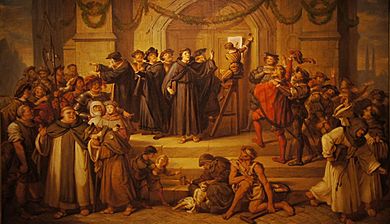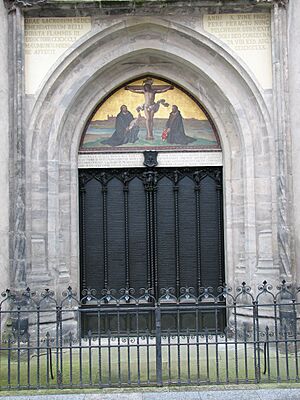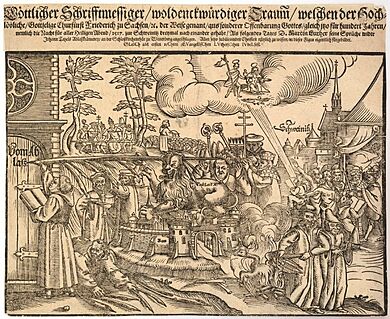Ninety-five Theses facts for kids
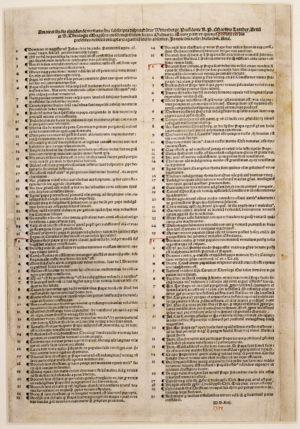
The 1517 Nuremberg printing of Ninety-five Theses, now housed at the Berlin State Library
|
|
| Author | Martin Luther |
|---|---|
| Original title | Disputatio pro declaratione virtutis indulgentiarum |
| Country | Germany |
| Language | Latin |
|
Publication date
|
31 October 1517 |
|
Original text
|
Disputatio pro declaratione virtutis indulgentiarum at Script error: The function "name_from_code" does not exist. Wikisource |
The Ninety-five Theses is a famous list of ideas written in 1517 by Martin Luther. He was a professor at the University of Wittenberg in Germany. This document is often seen as the start of the Reformation, a big change in the Christian church that led to the creation of Protestantism.
In his Theses, Luther shared his concerns about how the Catholic Church was selling "indulgences." These were like certificates that people bought to reduce the time they or their loved ones would spend in purgatory for their sins. Luther believed this practice was wrong and that it misled people.
He argued that true repentance for sins should come from inside a person, not just by doing an external act like buying an indulgence. Luther felt that indulgences made Christians think they didn't need to be truly sorry for their sins or help the poor. He believed that these certificates were not as spiritually valuable as good deeds.
Luther sent his Theses with a letter to a church leader, Albert of Brandenburg, on October 31, 1517. This date is now celebrated every year as Reformation Day. The Theses quickly spread across Germany and Europe. This led to many debates and made Luther very famous. Eventually, Luther was tried for heresy and removed from the church in 1521.
Contents
Why Luther Wrote the Theses
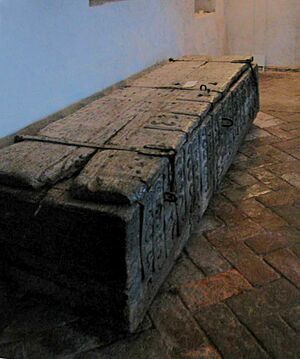
Martin Luther was a professor and preacher in Wittenberg. He wrote the Ninety-five Theses because he was worried about how the church was selling indulgences. At that time, the Catholic Church was the main Christian church in Western Europe.
In the church's system, when people sinned and confessed, they were forgiven. But they might still have to face "temporal punishment" for their sins. This punishment could be reduced by doing good deeds or, as the church taught, by buying an indulgence. If the punishment wasn't finished during life, it was believed it would be completed in Purgatory. Indulgences were supposed to lessen this time in Purgatory.
However, some church leaders started to sell indulgences to make money. The pope would approve these sales for a fee. People even bought "plenary indulgences," which were supposed to completely remove all remaining punishment for sins. These could be bought for people who were believed to be in Purgatory. This led to a popular saying: "As soon as the coin in the coffer rings, the soul from purgatory springs."
In 1515, Pope Leo X offered a special indulgence to help pay for the building of St. Peter's Basilica in Rome. This indulgence was said to cover almost any sin. Johann Tetzel was a preacher hired to sell these indulgences in areas near Wittenberg. Many people from Wittenberg traveled to buy them because they weren't sold in their own city.
Luther saw that his church members were buying Tetzel's indulgences. They believed they no longer needed to truly repent or change their lives to be forgiven. Luther had already preached against the misuse of indulgences since 1514. He felt they made God's grace seem cheap. After hearing Tetzel's sermons, Luther studied the issue more deeply. He believed that true repentance was much more important than buying an indulgence. He taught that an indulgence was only useful if a person had already confessed and truly repented.
What the Theses Said
The Ninety-five Theses are a list of ideas that Luther wanted to discuss. Here are some of the main points:
- True Repentance: The first thesis says that when Jesus Christ told people to "repent," he meant that a Christian's whole life should be about turning away from sin. Luther believed that repentance was an inner struggle with sin, not just an outward act like confessing to a priest.
- Pope's Power: Luther argued that the pope could only forgive punishments that he or the church had given out. The pope could not forgive the actual guilt of sin; only God could do that.
- Purgatory: Luther questioned common beliefs about Purgatory. He said that no one could truly know the spiritual state of people in Purgatory. He also denied that the pope had any power over souls there. He strongly disagreed with the idea that a soul was released from Purgatory as soon as money was paid. He saw this as encouraging greed.
- False Certainty: Luther believed that indulgence preachers gave Christians a false sense of security. He said that since no one truly knows if a person has repented, a letter promising forgiveness was dangerous.
- Indulgences and Good Deeds: Luther criticized indulgences because they discouraged acts of kindness. He taught that giving to the poor was far more important than buying indulgences. He said that doing good works makes a person better, but buying indulgences does not.
- Church's True Treasure: Luther stated that the real treasure of the church is the gospel of Jesus Christ, which is God's good news. He felt that the church's focus on selling indulgences was misleading people.
- Questions from Ordinary People: Luther listed many questions that everyday people were asking. For example, if the pope was so rich, why did he need money from poor believers to build St. Peter's Basilica? And if the pope could empty Purgatory, why didn't he just do it for free? Luther believed that ignoring these questions made the pope look bad.
Luther ended his Theses by telling Christians to follow Christ, even if it meant pain and suffering. He said that enduring hardship and going to heaven was better than a false sense of security from buying indulgences.
Luther's Goal
The Theses were written as ideas to be debated in a formal academic discussion. Luther was a doctor (a high academic degree), and holding such debates was common. He invited other scholars to join in.
Luther sent his Theses to Archbishop Albert of Mainz on October 31, 1517. He wanted to tell the archbishop about the problems caused by the indulgence sermons. Luther thought Albert might not know what was being preached in his name. He was worried that people were being led away from the true gospel.
It was normal for universities to print and post theses for public debate. While no original copies of a Wittenberg printing have survived, it's believed they were printed. A close friend of Luther, Philip Melanchthon, later said that Luther posted the Theses on the door of All Saints' Church, Wittenberg. This church was important because it displayed many holy relics, especially on All Saints' Day, the day after Luther sent his letter.
Even though Luther later said he didn't want the Theses to spread widely, they were quickly copied and printed. They were translated into German and sent to many people across Germany.
What Happened Next
Archbishop Albert received Luther's letter and the Theses around the end of November. He asked for opinions from other church leaders. In Rome, the pope and his advisers quickly saw Luther as a threat.
In February 1518, Pope Leo X asked Luther's religious order to make him stop spreading his ideas. A theologian named Sylvester Mazzolini was asked to write against Luther. Mazzolini focused on Luther questioning the pope's power. Luther was called to Rome in August 1518. He wrote Explanations of the Disputation Concerning the Value of Indulgences to try and clear his name. In this writing, Luther seemed to realize that his beliefs were more different from official church teachings than he first thought.
Johann Tetzel, the indulgence preacher, responded by calling for Luther to be burned for heresy. He had another theologian write 106 theses against Luther. Students at Luther's university even seized and burned copies of Tetzel's printed response. Luther became worried about the situation. He published a simpler pamphlet in German called Sermon on Indulgences and Grace, which became very popular.
Another opponent was Johann Eck, a friend of Luther's. Eck wrote a harsh attack, calling Luther a heretic. Luther responded angrily. The disagreement between Luther and Eck became public in a big debate in 1519.
Luther was later called to defend himself against heresy charges in Augsburg in October 1518. He refused to take back his statements. He was finally removed from the church in 1521 after he burned the pope's official letter threatening him.
Luther's Lasting Impact
The debate over indulgences, started by the Ninety-five Theses, was the beginning of the Reformation. This was a huge split in the Roman Catholic Church that led to major social and political changes across Europe.
Luther later said that the issue of indulgences was not as important as other ideas he would develop, like his belief that people are saved by faith alone. He didn't even think the Theses meant he was breaking away from Catholic teachings at the time. However, it was this controversy that pushed Luther into a leadership role in the Reformation.
The Theses also showed that Luther believed the church was not teaching properly and that this put ordinary people in danger. They also went against a papal decree from 1343, which said that indulgences were a "treasury of the church." This challenge to the pope's authority hinted at bigger conflicts to come.
October 31, 1517, the day Luther sent the Theses, has been remembered as the start of the Reformation since 1527. In 1617, for the 100th anniversary, there was a celebration with a procession to the Wittenberg Church where Luther was believed to have posted the Theses. An image was made showing Luther writing the Theses on the church door with a giant quill. This quill was shown piercing the head of a lion, which symbolized Pope Leo X. In 1668, October 31 became Reformation Day, an annual holiday in some parts of Germany. In 2017, the 500th anniversary of Reformation Day was celebrated as a national public holiday across Germany.
See also
 In Spanish: Las noventa y cinco tesis para niños
In Spanish: Las noventa y cinco tesis para niños
- Chinese 95 theses
 | Lonnie Johnson |
 | Granville Woods |
 | Lewis Howard Latimer |
 | James West |



